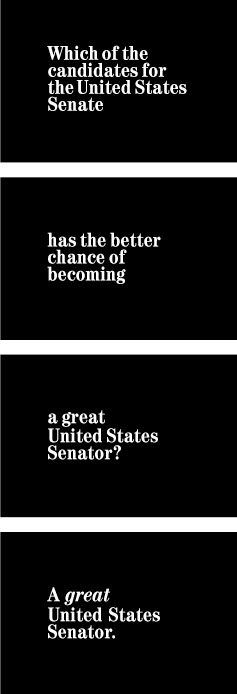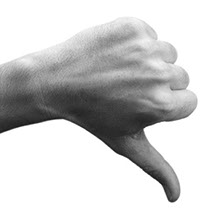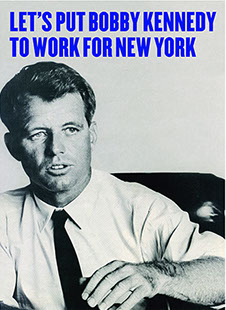RUTHLESS BOBBY THE CARPETBAGGER TAKES ON THE SILVER-HAIRED GRANDPA.
Less than two years after President John F. Kennedy was assassinated, Robert, his “ruthless little brother,” ran for the Senate. Working with him he struck me as an honest, principled leader who was desperately needed by New York, even if RFK wasn’t a New Yorker. We knew we had to sweep the “carpetbagger” label, or his candidacy could be stillborn. So months before any political advertising blitz normally begins, we plastered New York State with this straightforward message: Let’s put Robert Kennedy to work for New York.
Our strategy paid off as the “carpetbagger” handle evaporated. But as the campaign entered its final week, I was shaky because I feared Bobby might lose to incumbent senator Kenneth Keating as a result of a large undecided bloc, including many voters troubled still by the “ruthless” label. I begged Kennedy and his campaign manager, brother-in-law Steve Smith,to let me immediately produce and run a 20-second TV spot that would cause voters to think hard as an ominous voice says: When you’re in the election booth, think about this...followed by words in white type moving against a foreboding black background, Which of the candidates for the United States Senate has the better chance of becoming a great United States Senator? A GREAT United States Senator. It was a powerful, unexpected way to say that Robert Kennedy, warts and all, would make a truly great senator, while Keating would go on being an amiable hack. The large undecided bloc came to their senses, and in a stunning response to reason made our assassinated president’s brother their senator from New York, with a plurality of 720,000 votes. Some months later, when we were having lunch, Steve Smith said to Bobby and me, “Maybe we would still have won without that last-minute attack, but that was the best political commercial I ever saw!”


“GIVE ME A LEVER AND I CAN MOVE THE WORLD.”
Robert Kennedy was fearless and decisive when I showed him ads and brochures and TV spots I wanted to produce for him for his successful run for the Senate in 1964, and we (usually) enjoyed dueling with each other. One day, however, I was in a limo with Bobby, headed for a rally in the mean streets of Brooklyn’s Bedford-Stuyvesant, known in those days as a black “ghetto.” His give-and-take conviction in the streets was turning New York on. He loved to quote Aeschylus and he was no slouch on Archimedes. “One thing I learned when working with President Kennedy,” he would say, “is that one man can make a difference. As Archimedes once said, ‘Give me a lever and I can move the world.’” As he bit off the line, he would thrust a thumbs-up fist at the audience.
In the limo filled with his top aides, going over the Brooklyn Bridge, I told Bobby, “I like the Archimedes line, especially since a Greek wrote it. But you’re not going to use it on the corner of Bedford and Nostrand, are you?” Bobby jumped all over me, implying – hell, accusing me of being a racist. Instead of arguing over the use of intellectually elitist allusions, I became enraged and blurted out something like “Your old man was a Nazi and you worked for that fascist Joe McCarthy and you’re busting my balls?!” We didn’t say another word all the way to Bed-Stuy.
Bobby was in rare form that day, and the enormous crowd was spellbound. Suddenly, he leaned forward and built up to “as Archimedes once said, "give me a lever and I can move the world” with his arm thrust out and his sleeve rolled-up, giving his thumbs-up. He drew a complete blank from his audience. Bobby paused, searched the all-black crowd and spotted my lone white face, stared into my eyes at least a hundred feet away, and turned his thumb straight down.

